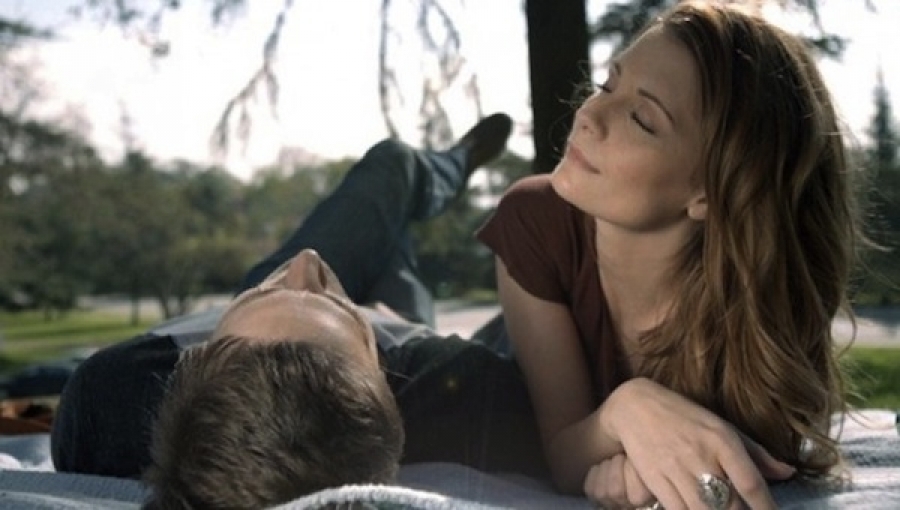I Will Follow You into the Dark markets itself as a thriller/horror/suspense, when, actually, it is more of a romantic drama with elements of suspense. The story centers around Misha Barton’s character, Sophia, and her inability to open up to love following the death of her mother and, most recently, her father. It is a tale for the hopeless romantic and, oddly enough, a valid choice for a girls’ night out. Just be prepared with tissues, wine, and (if you are anything like me) a punching bag for when the ghosts pop out so your best friend doesn’t accidentally get smacked again. If you were a fan of the Twilight series or any epic love tales, this movie is one for you to check out.
SPOILERS BELOW
Time is nonlinear in the film, and, often, the audience is not sure how much time has passed, giving a feel of wandering aimlessly with the character. Action is slow paced along with the dialogue, and camera shots are done through diffused and soft lightening, often giving a glowing, ethereal look as if we are in a dream with Sophia. All of these elements blend wonderfully to create a sense of loss and confusion; however, they also drag the action and, at times, create gaps of seemingly pointless sections of dialogue or action shots. I was often left wondering, where is all of this leading? The shots are beautiful and the locations stunning, but I usually found myself more interested in watching the imagery than the story; something was missing.
What was missing most for me was that I wasn’t interested in Sophia’s character. Yes, the character is supposed to be depressed and uninterested in life, love, and the expression of emotions; however, Misha Barton’s delivery is so unaffected that it came across as elitist, uncaring, and unsympathetic, which I do not believe was her intent. Her love interest Adam, played by Ryan Egghold, was not given enough screen time to truly develop his character or their relationship. He comes across charming despite the cheesy pickup lines. In fact he uses their awkwardness to appear uncomfortable and endearing. Ryan and Misha’s chemistry is undeniable, so much so that Misha’s performance softens when he is on screen with her. Unfortunately, that is not for long. Losing him so early in the film is not surprising or thrilling, it is only frustrating. We aren’t invested enough in their relationship to warrant watching her mission to find and save him as much as we want to be. The screenwriter was very creative in devising a way to “speed up their relationship” by using a montage that overlaps their first intimate moment. It was confusing when she awoke suddenly and it was apparently much later in the relationship. I spent the latter half of the film convinced that none of this was real. This montage, while cinematically interesting and textually creative, was not able to pull me into their relationship and may have, in fact, done more harm than good. Maybe if there had been just a little more time invested beforehand it would have felt more complete to me.
As a lover of horror and thrillers, I would have liked more from Sophia’s search for Adam. Partly, I didn’t really understand why he was gone, and the whole scenario felt a bit contrived. But, mostly everything felt rushed at this point. While the pacing of the movie was slow – in actuality, the writer was trying to pack way too much into an hour and a half – trying to make everything equally important. There were some great, startling effects throughout the search. The design team, along with the cinematography and sound teams, did astounding jobs using “natural” elements to create eeriness. This was not about blood and gore, but rather the building itself became the ghost – its draperies, candles, wallpaper, floorboards, and rocking chairs. The effect proved hauntingly real and kept me on edge. But, even this was not enough to draw me in, as I still wasn’t invested in the outcome. I actually only became invested in the outcome right at the end for selfish reasons, because I could see where the ending was heading and it was a trend of late that deeply concerns me. It is not a new concept for young lovers to kill themselves to be “together;” Shakespeare’s Romeo and Juliet is one of the most famous and historic examples; however, film and TV-makers today do not seem to realize the power they yield with their stories. Does this mean they shouldn’t make them? Absolutely not. It does mean I think that they should take some responsibility in the portrayal. The issue I have is not that Sophia chooses to stay dead to “be” with Adam, because she thinks they will live happily ever after (although I am kind of sick of women doing this), but that the film shows them living happily ever after. Why does it have to have a happy ending? Because we feel bad she is dead? We want to make people feel happy? We don’t want to scare people into not committing suicide? All great questions to which I have no answer and probably neither does the filmmaker. Maybe this is the point of telling these stories . . . to start a conversation. Who knows?

